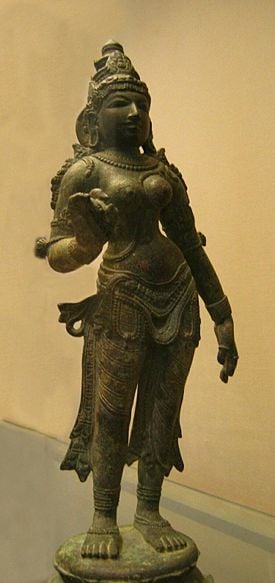Bhudevi
| ||||||||||
Bhuma Devi or Bhumi Devi or Bhu Devi is the divine wife of Lord Varaha, an Avatar of Lord Vishnu. According to Hindu mythology, the divine saint Andal is a form of her. The demon Narakasura whose killing by Krishna is celebrated as the festival of Diwali is her son.[1]. She is the mother of Sita, (note the symbolism of the baby Sita being found in a ploughed field). According to the uttara-kanda, when Sita finally leaves her husband Rama, she returns to Bhumi. Bhumi Devi is also believed to be one of the two forms of Lakshmi. The other is Sridevi, who remains with Narayana. Bhudevi is the Goddess of Earth, and the fertility form of Lakshmi.[2]
Other Names for the Goddess
Prithvi is also called Dhra, Dharti, Dhrithri, meaning thereby, which holds everything. As Prithvi Devi, she is one of two wives of Lord Vishnu. His other wife is Lakshmi.
Prithvi is another form of Lakshmi. Another name for Her is Bhumi or Bhudevi or Bhuma Devi.
Mythology
Prithvi (Sanskrit: pṛthvī, also pṛthivī) is the Hindu earth and mother goddess. According to one tradition, she is the personification of the Earth, and to another its Mother, being prithivi tattwa, the essence of the element earth.
As prithvi mata "Mother Earth" she contrasts with Dyaus pita "father sky". In the Rigveda, Earth and Sky are frequently addressed in the dual, probably indicating the idea of two complementary half-shells.
She is the wife of Dyaus Pita ('father Dyaus'). (The widespread belief that these two were originally a single deity appears to be mistaken. See Dyavaprthivi). She is the mother of Indra and Agni. According to a tradition, when Indra killed Dyaus Pita, she applauded and married him. She is associated with the cow. Prithu, an incarnation of Vishnu, milked her in the cow's form to get food from her.
Iconography
In art she is represented as a woman with four arms and a green skin.
Notes
- ↑ killing of Narakasura.
- ↑ It is interesting to note that several female deities have had births similar to Sita. Alamelu Thayar of Tiruchanur had a similar beginning, being found in a ploughed field by Akasa Raja. Goda (Andal) was found under a Tulasi plant by Perialvar.
ReferencesISBN links support NWE through referral fees
- Dictionary of Hindu Lore and Legend (ISBN 0-500-51088-1) by Anna Dallapiccola
- Hindu Goddesses: Vision of the Divine Feminine in the Hindu Religious Traditions (ISBN 81-208-0379-5) by David Kinsley
Credits
New World Encyclopedia writers and editors rewrote and completed the Wikipedia article in accordance with New World Encyclopedia standards. This article abides by terms of the Creative Commons CC-by-sa 3.0 License (CC-by-sa), which may be used and disseminated with proper attribution. Credit is due under the terms of this license that can reference both the New World Encyclopedia contributors and the selfless volunteer contributors of the Wikimedia Foundation. To cite this article click here for a list of acceptable citing formats.The history of earlier contributions by wikipedians is accessible to researchers here:
The history of this article since it was imported to New World Encyclopedia:
Note: Some restrictions may apply to use of individual images which are separately licensed.

